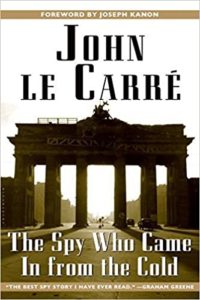
The Spy Who Came In From the Cold
By John le Carré
256 pages
Published January 1, 1963 by Coward-McCann
This was the Mules’ January book selection. As I’m writing this, we haven’t yet met, so I can’t report on the members’ opinions, but I suspect they will be positive.
About a year after the Berlin Wall was erected, Leamas, a British agent, at the end of a long and difficult career where he has seen all of his operatives killed by the Communists, is sent to East Germany to bring down Hans Dietr Mundt, an important East German intelligence officer, by posing as a defector and “divulging” false information insinuating that Mundt is a traitor to the East Germans.
Of course, few things go as planned. Especially in this genre of fiction. There are surprises in store – for Leamus and for the reader – almost every other page, including a fateful love affair, the continual appearance of entertaining secondary characters, and lots of twists and turns in the action, topped off by one major surprise at the end.
As a spy novel, The Spy Who Came In From the Cold was fully satisfying. Two things, however, make it better than genre fiction.
At one level, it is a critique of the Cold War and the questionable tactics Western governments used in competing with the Russians.
At another level, it is a critique of ideological thinking per se – and how it lends itself to all sorts of useless and destructive actions that could not and did not make any sense in the light of reason.
In fact, some of the most enjoyable parts of the book, for me, were a series of conversations between Leamas and Fiedler, an East German spy, on their respective life views and career motivations.
The novel received critical acclaim at the time of its publication and became an international bestseller. It was selected as one of the 100 All-Time Best Novels by Time magazine.
From J.B. Priestly: “Superbly constructed, with an atmosphere of chilly hell.”
From The Guardian: “Le Carré handles the unspooling web of narrative and motive with exemplary poise.”

 MarkFord
MarkFord

